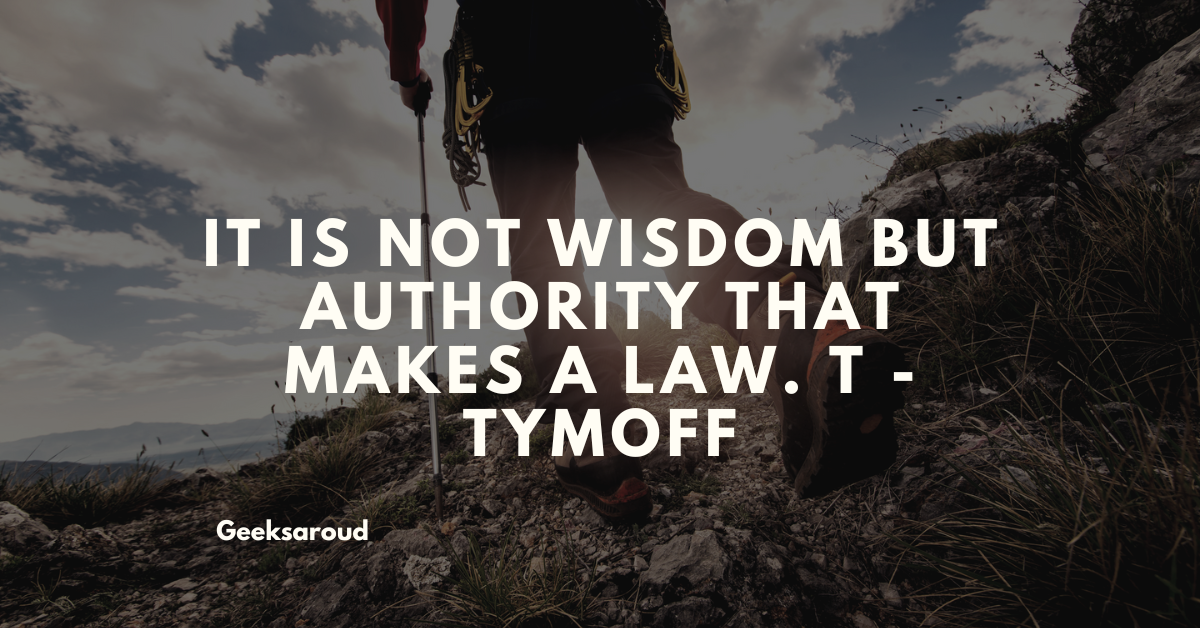it is not wisdom but authority that makes a law. t – tymoff
In the domain of law, it is not wisdom but authority that lays the groundwork for laws, exerting influence through its power and legitimacy. Tymoff explores the crucial role authority holds in crafting and upholding legal structures, highlighting the essential interplay between governance and sagacity in shaping societal norms and regulations.
The nuanced balance between authoritative enforcement and wise discernment fundamentally shapes the fairness, progress, and stability of legal systems. Understanding this dynamic interplay is essential for comprehending the intricate mechanisms underpinning the creation and implementation of just laws.
Key Takeaways
- Authority provides legitimacy and power to laws.
- Wisdom guides the creation of just and effective legal frameworks.
- Governments, courts, and law enforcement hold authority in enforcing laws.
- Balance between authority and wisdom is crucial in law-making.
- Wise lawmakers ensure fairness, progress, and harmony in legal systems.
Understanding the Influence of Laws
In scrutinizing the influence of laws, one cannot overlook the intricate interplay between authority and wisdom, both pivotal in shaping the fabric of legal systems worldwide. The dynamic between authority, which bestows legitimacy and power upon laws, and wisdom, which guides the creation of just and effective legal frameworks, is essential for guaranteeing the equitable functioning of societies.
Authority, vested in governments, courts, and law enforcement agencies, provides the necessary foundation for the enforcement of laws, maintaining order and upholding societal norms. On the other hand, wisdom plays a significant role in crafting laws that are not only just but also reflective of the values and needs of the populace.
By incorporating foresight, ethical considerations, and a deep understanding of societal dynamics, wise lawmakers can ensure that laws promote fairness, progress, and harmony within communities. Therefore, a delicate balance between authority and wisdom is imperative for the creation and enforcement of laws that serve the greater good and foster a just and inclusive society.
Tracing the Historical Origins
The historical foundations of the quote ‘It Is Not Wisdom but Authority That Makes a Law’ can be traced back to ancient civilizations and philosophical discourse on the origins and legitimacy of legal systems. In ancient societies, laws were often established based on the authority of rulers, reflecting a system where power dictated the creation and enforcement of laws.
Thinkers such as Plato and Aristotle explored questions regarding the legitimacy of laws, with some arguing that laws rooted in wisdom and ethical considerations lead to a more just and equitable society. This historical context underscores the ongoing debate surrounding the source of legitimacy in legal systems, highlighting the tension between laws derived from authority and those grounded in wisdom.
Understanding the historical evolution of legal systems sheds light on the complexities of balancing authority and wisdom in law-making processes, emphasizing the significance of considering both aspects to ensure the just and effective governance of societies.
Authority’s Role in Legal Systems
Authority in legal systems exerts a commanding influence, shaping the foundation upon which laws are established and upheld. It is through authority that laws are given legitimacy and power. Governments, courts, and law enforcement agencies play pivotal roles in enforcing laws, deriving their authority from constitutions and statutes.
Centralized authority is essential for maintaining societal order and ensuring the rule of law. The balance between authority and wisdom is important for the administration of justice within legal systems. While authority provides the necessary structure and enforcement mechanisms for laws, wisdom contributes to the creation of just and effective legal frameworks.
Hence, the interplay between authority and wisdom in legal systems is essential for ensuring that laws are not only upheld but also reflective of societal values and needs. Striking a harmonious balance between these two elements is imperative for the successful functioning of legal systems and the promotion of justice and fairness in society.
The Impact of Wisdom in Legislation
Wisdom plays a pivotal role in shaping the effectiveness and fairness of legislative frameworks. When laws are crafted with wisdom as a guiding principle, they are more likely to address societal needs and promote equity. The impact of wisdom in legislation can be profound, influencing not only the content of laws but also their long-term consequences. Here are four key ways in which wisdom contributes to creating effective laws:
- Consideration of Societal Values: Wise lawmakers take into account the values and beliefs of the society for which the laws are being created.
- Anticipation of Unintended Consequences: Wisdom allows for the anticipation of potential unintended consequences of laws, enabling preemptive measures to mitigate negative outcomes.
- Promotion of Equity and Inclusivity: Laws rooted in wisdom tend to be more inclusive and equitable, ensuring that all members of society are considered and protected.
- Long-term Implications: Wise laws consider the long-term implications and effects on future generations, aiming for sustainable and beneficial outcomes.
Contrasting Authority and Wisdom in Laws
In the domain of legal systems, a delicate balance between power and sagacity shapes the foundation of laws. Authority, derived from governments, courts, and law enforcement, provides the necessary legitimacy and enforcement power to uphold laws. It is the backbone that guarantees societal order and compliance.
In contrast, wisdom in legislation reflects a deeper understanding of societal needs, values, and long-term implications. Laws crafted with wisdom consider ethical principles, promote equity, and anticipate unintended consequences, leading to a more just and compassionate legal framework.
While authority-based laws often emphasize strict penalties and enforcement, wisdom-driven laws prioritize fairness, compassion, and foresight. The interplay between authority and wisdom in legislation highlights the need for a balanced approach to law-making.
By harmonizing the authoritative power of enforcement with the insightful considerations of wisdom, legal systems can better serve the interests of society as a whole. Striking this balance is essential for creating effective, just, and compassionate laws that uphold the principles of justice and equity.
Balancing Justice and Compassion
Balancing justice and compassion is a critical endeavor in the domain of law and governance, necessitating a nuanced approach that considers the welfare of individuals and the integrity of societal systems. This delicate balance guarantees that legal systems remain just, fair, and compassionate towards all members of society.
- Equity: Guaranteeing fair treatment and opportunities for all individuals, regardless of background or circumstances.
- Mercy: Displaying compassion and understanding when enforcing laws, taking into account unique situations and mitigating factors.
- Restitution: Seeking to restore and heal the harm caused by injustices, focusing on rehabilitation and reconciliation.
- Empathy: Cultivating a deep understanding of the experiences and perspectives of those affected by legal decisions, fostering a more humane and just legal system.
Harmonizing Enforcement and Consideration
Efficient governance hinges on the seamless integration of rigorous enforcement practices with thoughtful consideration of societal needs and values. It is imperative that the enforcement of laws is not carried out blindly but is harmonized with a deep understanding of the diverse needs and values within society. By aligning enforcement measures with careful consideration of the impacts on individuals and communities, authorities can guarantee that justice is served in a fair and equitable manner.
Harmonizing enforcement and consideration requires a delicate balance between upholding the rule of law and demonstrating empathy and understanding towards those affected by it. Enforcement actions should be guided by principles of compassion, fairness, and foresight to prevent unintended harm and promote positive social outcomes. By taking into account the broader implications of enforcement decisions, authorities can cultivate a system that not only maintains order but also fosters trust and cooperation among the populace.
In essence, the effective governance of a society necessitates a harmonious blend of enforcement practices and consideration for the well-being of its members. Only through this harmonization can laws truly accomplish their purpose of upholding justice and promoting the common good.
Frequently Asked Questions
How Do Societal Perceptions Influence the Creation of Laws?
Societal perceptions play a pivotal role in shaping laws by influencing lawmakers’ decisions. Public values, norms, and demands impact the creation of legislation, reflecting the collective understanding of justice, morality, and order within a society.
What Are the Implications of Questioning the Legitimacy of Laws?
Questioning the legitimacy of laws prompts critical evaluation of power structures and ethical foundations. It challenges societal norms, fostering growth and reform. Such inquiries can lead to advancements in justice, equity, and governance practices.
How Does Authority Impact the Enforcement of Laws?
Authority plays a pivotal role in law enforcement by providing legitimacy and power to laws. Governments, courts, and law enforcement agencies enforce laws based on authority derived from constitutions and statutes, essential for maintaining societal order and justice.
What Distinguishes Wise Laws From Those Based on Authority?
Wise laws prioritize societal well-being, reflect ethical considerations, and anticipate long-term impacts. They are rooted in understanding and empathy, seeking harmony between justice and compassion. Authority-based laws often focus on power and enforcement, potentially overlooking human nuances and societal needs.
Can Laws Effectively Balance Justice, Compassion, and Enforcement?
Laws can successfully harmonize justice, compassion, and enforcement by integrating wisdom into legislative processes. Striking a balance guarantees equitable outcomes, upholding societal values and promoting a just and compassionate legal framework.
Conclusion
To sum up, the interplay between authority and wisdom in the creation of laws is a complex and intricate process that has far-reaching implications for society. While authority plays a vital role in enforcing laws, wisdom brings a sense of equity, foresight, and societal harmony to legal frameworks. By striking a balance between the two, legal systems can achieve a harmonious blend of justice, compassion, and effective enforcement, ultimately shaping a more equitable and just society.







